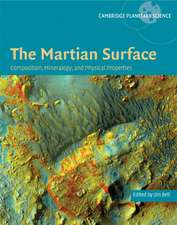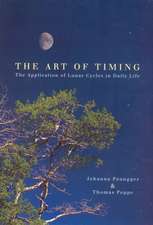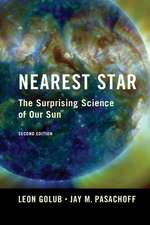The Transits of Extrasolar Planets with Moons: Springer Theses
Autor David M. Kippingen Limba Engleză Paperback – 27 noi 2013
In this thesis, David Kipping shows how transiting planets may be used to infer the presence of exomoons through deviations in the time and duration of the planetary eclipses. A detailed account of the transit model, potential distortions, and timing techniques is covered before the analytic forms for the timing
variations are derived. It is shown that habitable-zone exomoons above 0.2 Earth-masses are detectable with the Kepler space telescope using these new timing techniques.
| Toate formatele și edițiile | Preț | Express |
|---|---|---|
| Paperback (1) | 636.63 lei 6-8 săpt. | |
| Springer Berlin, Heidelberg – 27 noi 2013 | 636.63 lei 6-8 săpt. | |
| Hardback (1) | 640.88 lei 6-8 săpt. | |
| Springer Berlin, Heidelberg – 8 aug 2011 | 640.88 lei 6-8 săpt. |
Din seria Springer Theses
- 18%
 Preț: 997.88 lei
Preț: 997.88 lei -
 Preț: 389.88 lei
Preț: 389.88 lei - 15%
 Preț: 646.94 lei
Preț: 646.94 lei - 18%
 Preț: 943.43 lei
Preț: 943.43 lei -
 Preț: 399.29 lei
Preț: 399.29 lei - 18%
 Preț: 944.99 lei
Preț: 944.99 lei - 15%
 Preț: 636.80 lei
Preț: 636.80 lei - 18%
 Preț: 941.05 lei
Preț: 941.05 lei - 15%
 Preț: 643.16 lei
Preț: 643.16 lei - 15%
 Preț: 642.68 lei
Preț: 642.68 lei - 18%
 Preț: 1103.62 lei
Preț: 1103.62 lei - 20%
 Preț: 558.83 lei
Preț: 558.83 lei - 18%
 Preț: 1112.30 lei
Preț: 1112.30 lei - 18%
 Preț: 944.19 lei
Preț: 944.19 lei - 18%
 Preț: 1109.92 lei
Preț: 1109.92 lei - 18%
 Preț: 1217.27 lei
Preț: 1217.27 lei - 15%
 Preț: 640.06 lei
Preț: 640.06 lei - 15%
 Preț: 636.45 lei
Preț: 636.45 lei - 15%
 Preț: 640.06 lei
Preț: 640.06 lei - 15%
 Preț: 640.88 lei
Preț: 640.88 lei -
 Preț: 389.70 lei
Preț: 389.70 lei - 20%
 Preț: 563.91 lei
Preț: 563.91 lei -
 Preț: 393.35 lei
Preț: 393.35 lei - 15%
 Preț: 637.93 lei
Preț: 637.93 lei - 15%
 Preț: 641.85 lei
Preț: 641.85 lei - 18%
 Preț: 1225.94 lei
Preț: 1225.94 lei - 20%
 Preț: 551.36 lei
Preț: 551.36 lei - 18%
 Preț: 1229.10 lei
Preț: 1229.10 lei - 15%
 Preț: 639.25 lei
Preț: 639.25 lei - 18%
 Preț: 999.45 lei
Preț: 999.45 lei - 15%
 Preț: 640.06 lei
Preț: 640.06 lei - 18%
 Preț: 1220.45 lei
Preț: 1220.45 lei - 18%
 Preț: 1116.26 lei
Preț: 1116.26 lei - 18%
 Preț: 1110.72 lei
Preț: 1110.72 lei - 18%
 Preț: 1000.87 lei
Preț: 1000.87 lei - 18%
 Preț: 891.17 lei
Preț: 891.17 lei - 15%
 Preț: 640.06 lei
Preț: 640.06 lei - 5%
 Preț: 1154.07 lei
Preț: 1154.07 lei - 15%
 Preț: 635.96 lei
Preț: 635.96 lei - 15%
 Preț: 640.88 lei
Preț: 640.88 lei -
 Preț: 387.20 lei
Preț: 387.20 lei - 18%
 Preț: 1109.92 lei
Preț: 1109.92 lei -
 Preț: 385.25 lei
Preț: 385.25 lei -
 Preț: 385.25 lei
Preț: 385.25 lei - 18%
 Preț: 1112.30 lei
Preț: 1112.30 lei - 18%
 Preț: 999.45 lei
Preț: 999.45 lei -
 Preț: 386.99 lei
Preț: 386.99 lei - 15%
 Preț: 637.13 lei
Preț: 637.13 lei - 20%
 Preț: 554.21 lei
Preț: 554.21 lei - 20%
 Preț: 555.59 lei
Preț: 555.59 lei
Preț: 636.63 lei
Preț vechi: 748.97 lei
-15% Nou
Puncte Express: 955
Preț estimativ în valută:
121.83€ • 132.29$ • 102.34£
121.83€ • 132.29$ • 102.34£
Carte tipărită la comandă
Livrare economică 22 aprilie-06 mai
Preluare comenzi: 021 569.72.76
Specificații
ISBN-13: 9783642271205
ISBN-10: 3642271200
Pagini: 220
Ilustrații: XVII, 200 p. 42 illus., 2 illus. in color.
Dimensiuni: 155 x 235 x 12 mm
Greutate: 0.31 kg
Ediția:2011
Editura: Springer Berlin, Heidelberg
Colecția Springer
Seria Springer Theses
Locul publicării:Berlin, Heidelberg, Germany
ISBN-10: 3642271200
Pagini: 220
Ilustrații: XVII, 200 p. 42 illus., 2 illus. in color.
Dimensiuni: 155 x 235 x 12 mm
Greutate: 0.31 kg
Ediția:2011
Editura: Springer Berlin, Heidelberg
Colecția Springer
Seria Springer Theses
Locul publicării:Berlin, Heidelberg, Germany
Public țintă
ResearchCuprins
1 Introduction.- 2 Extrasolar Moons.- 3 The Transiting Planet.- 4 Timing the Transit.- 5 Transit Distortions.- 6 Transit Timing Effects due to an Exomoon.- 7 Detectability of Habitable Exomoons with Kepler-Class Photometry.- 8 Conclusions & Future Work.- A Notations & Acronyms.
Notă biografică
Dr. Kipping got his PhD in Astrophysics from University College London in 2011. He is Carl Sagan Fellow at Harvard College Observatory.
Textul de pe ultima copertă
Can we detect the moons of extrasolar planets? For two decades, astronomers have made enormous progress in the detection and characterisation of exoplanetary systems but the identification of an "exomoon" is notably absent.
In this thesis, David Kipping shows how transiting planets may be used to infer the presence of exomoons through deviations in the time and duration of the planetary eclipses. A detailed account of the transit model, potential distortions, and timing techniques is covered before the analytic forms for the timing
variations are derived. It is shown that habitable-zone exomoons above 0.2 Earth-masses are detectable with the Kepler space telescope using these new timing techniques.
In this thesis, David Kipping shows how transiting planets may be used to infer the presence of exomoons through deviations in the time and duration of the planetary eclipses. A detailed account of the transit model, potential distortions, and timing techniques is covered before the analytic forms for the timing
variations are derived. It is shown that habitable-zone exomoons above 0.2 Earth-masses are detectable with the Kepler space telescope using these new timing techniques.
Caracteristici
A PhD thesis of exceptionally high standard Opens a new field of research for exomoons Topic with significant impact in outreach to a wider public











